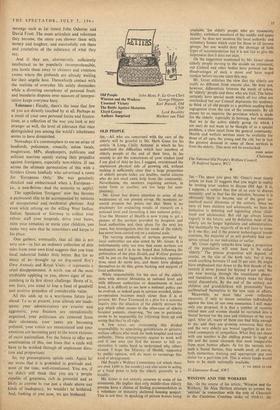Old People John Winston and the Workers Unarmed Victory The
Battle Against Motorists Lloyd George Authors Surprised Moss, F. Le Gros Clark George Phip pen Earl Russell, OM CND Lord Boothby Herbert van Thal OLD PEOPLE
SIR,—All who are concerned with the care of the elderly, will be grateful to Mr. Herb Greer for his article 'A Long, Chilly Autumn' in which he has underlined the difficulties which face numbers of elderly people at the end of their lives. In his anxiety to stir the consciences of your readers (and I am glad of this) he has, I suggest, overstressed the unpleasant physical side of growing old, without making it sufficiently clear that a large proportion of elderly people today are healthy, useful citizens who do not need extra help from the community. Nevertheless, the numbers requiring services, in some form or another, are too large for com- placency. Mr. Greer has drawn attention to some of the weaknesses of our present set-up. He mentions re- search projects but points out that 'there is no machinery for evaluating results of research on a national level and funnelling it into national policy.' True the Minister of Health is now trying to get a picture of the services provided by hospitals and local authorities and their plans for the next ten• years, but investigation into the needs of the elderly has never been carried out on a national scale.
The varying standards of services provided by local authorities are also noted by Mr. Greer. It is unfortunately only too true that some services are inadequate and it is to be hoped that following the publication of the plan Health, and Welfare pressure will be put on the laggards. But voluntary organisa- tions must do more too, and many have pledged themselves to do this, given backing and support of local authorities.
While responsibility for the care of the elderly rests with several Ministries at national level and with different authorities or departments at local level, it is difficult to see how a national policy can be evolved, or indeed gaps in services avoided, unless co-operation becomes much closer than it is at present. Mr. Peter Townsend in a plea for a national inquiry into the situation of the elderly stresses the gap which often occurs in the after-care of elderly hospital patients, observing, 'No one in particular seems to be responsible for following them up and seeing that they're all right.'
A few areas are overcoming this divided responsibility by appointing geriatricians or geriatric welfare officers who work for both hospital and local authority. These arrangements appear to work well and if one area can find the answer to full co- operation it seems hard to understand why others cannot. I hope the Ministry of Health, supported by public opinion, will do more to encourage this kind of arrangement.
Old People's Welfare Committees (of which there are over 1,600 in the country) can also assist in acting as a focal point to help the elderly generally in a locality.
Mr. Greer is not entirely accurate in some of his statements. He implies that only middle-class elderly persons have a chance of finding accommodation in a voluntary or statutory sheltered housing project. This is not true. In speaking of private homes being available 'for elderly people who' are reasonably healthy, ambulant members of the middle and upper classes' he does,not mention the local authority and voluntary homes which exist for those in all income groups. No one would deny the shortage of both types of accommodation but it is not fair to give the impression that it does not exist.
On the suggestion mentioned by Mr. Greer about elderly people moving to the seaside on retirement, our Council and other bodies have pointed out the disadvantages of such a move and have urged caution before anyone takes this step.
Mr. Greer criticises the view that the elderly are really no different from anyone else. He does not, however, differentiate between the needs of active, fit 'elderly' people and those who are frail. The latter certainly have special needs which all too often are overlooked but our Council deprecates the tendency to think of all old people as a problem needing their segregation from the rest of the community. By all means let us improve the provision which is made for the elderly, especially in housing, but remember that we in the active elderly group (in which I am one) do not want to be thought of as a special problem, a class apart from the general community. Health and welfare services must be available for those of all ages, the young and the old, but in fact the greatest demand in some of these services is from the elderly. This must not be overlooked.
26 Bedford Square, WCI






































 Previous page
Previous page